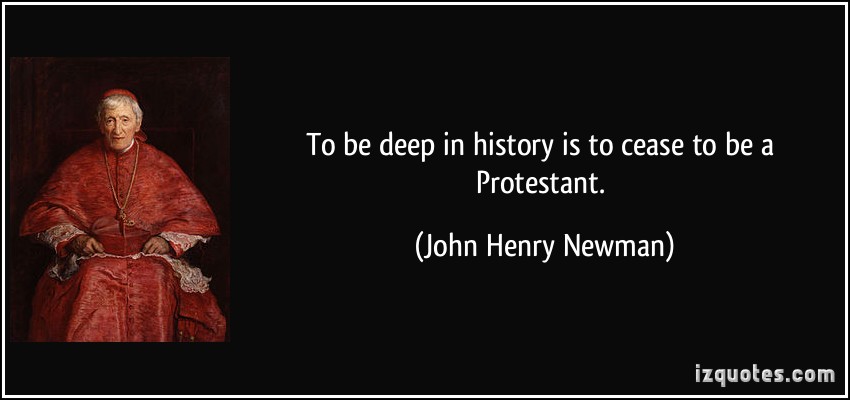no scripture, no scripture. now as I have said before, if you want to hold a conversation instead of a discussion, that's what facebook and tweeter for.Protestantism has been compelled to rewrite all history according to it’s own necessities. As French historian Augustin Thierry has written, “To live, Protestantism found itself forced to build up a history of its own.”
John Henry Cardinal Newman (1801-1890), the great English convert to Catholicism, who is widely regarded as one of the most profound religious thinkers of his time, wrote in his Essay on the Development of Christian Doctrine (1845), the one indispensable work on this subject:
One thing at least is certain; whatever history teaches . . . at least the Christianity of history is not Protestantism. If ever there were a safe truth, it is this. And Protestantism . . . as a whole, feels it, and has felt it. This is shown in the determination . . . of dispensing with historical Christianity altogether, and of forming a Christianity from the Bible alone . . . To be deep in history is to cease to be a Protestant.In other words, forming a history of Christianity from the Bible alone is IMPOSSIBLE.
First Council of Nicaea (325) First Council of Constantinople (381) First Council of Ephesus (431) Council of Chalcedon (451) ALL clarified the Trinity due to challenging heresies.
Here is a list of women bishops attending these councils:

As far back as the third century, Irenaeus and Tertullian denounced gnostic and Marcionite heretics for letting women perform priestly functions. In the fourth century St. Epiphanius of Salamis condemned the Montanists for claiming that the difference between the sexes had been abolished in Christ, and for consequently ordaining women as presbyters and bishops. St. Epiphanius pointed to our Lord’s deliberate choice of twelve men as Apostles and added that if a woman could be ordained, “it would have been more proper to Mary than to anyone else in the New Testament to exercise a priestly role.” Not only did our Lord include no woman among the twelve, but the Apostles did not appoint one among their successors. The tradition of the Church is unbroken, and the fundamental reason behind it is the will of Christ.
In the third and fourth centuries the Didascalia and Apostolic Constitutions also justified reserving priestly ordination to men as “the will of Christ” and the “law of the Gospel.” It was noted that the Virgin Mary and the holy women in our Lord’s company were not sent to teach because the Lord “knew the arrangement of nature…being as he was the architect of nature.” As the “author of human nature” and “giver of the law,” our Savior knew best how to assign responsibilities. Likewise, in the Middle Ages, the Scholastics were “unanimous” in saying that women could not be ordained, some adding that any attempted ordination would be invalid. The point about the Virgin Mary found its way into the canonical collection of papal decretals, to emphasize that the exclusion of women from the priesthood was not related to their dignity but to “determination by Christ.”
Early Church Fathers Women's Ordination
You are simply rehashing the same gnostic, Marcionite and Montanist heresies of the 3rd century.

until you can come to the table with scripture or research, because I have the early church fathers letter. until then ......... Mute :cool:.

